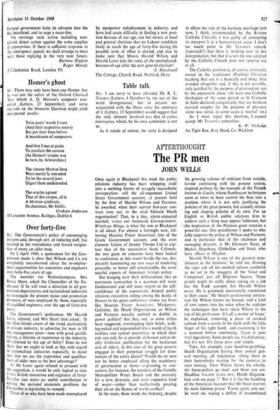Over forty-five
Sir: The Government's policy of encouraging mergers and, through sEr, of reducing staff, has resulted in the redundancy and forced resigna- tion of many an older man.
On 2 April 1968, a spokesman for the Gov- ernment made it clear that Wilson and Co are completely unconcerned about the re-employ- ment opportunities for executives and engineers over forty-five years of age.
The member for Wolverhampton, Mrs Renee Short, asked the Chancellor of the Ex- chequer `if he will issue a direction to all gov- ernment departments and nationalised industries to investigate the present status and promotion prospects of men employed by them, especially of qualified engineers, over the age of forty-five years.'
The Government's spokesman, Mr Harold Lever, refused, and Mrs Short then asked: 'Is my Hon friend aware of the trend, particularly in private industry, to advertise for men to fill top management posts—men with good qualifi- cations, a lifetime of experience in the industry, all achieved by the age of thirty? Does he not think that we ought to look at this with regard to nationalised industries especially, to make sure that we use the experience and qualifica- tions of older men to the best advantage?' As Mr Lever again-refused to proceed with the suggestion, it would be only logical to take it that British executives and engineers of forty- five-plus can make no useful contribution to solving the national economic problems the Chancellor is legislating to remedy.
Those of us who have been made unemployed by manpower redeployment in industry, and have had acute difficulty in finding a new posi- tion because of our age, can but ensure at local and general elections that no Labour candidate likely to reach the age of forty-five during his possible term of office is elected, and also to make sure that Messrs Harold Wilson and Harold Lever join the ranks of the unemployed- because-of-age after the next general election!






































 Previous page
Previous page